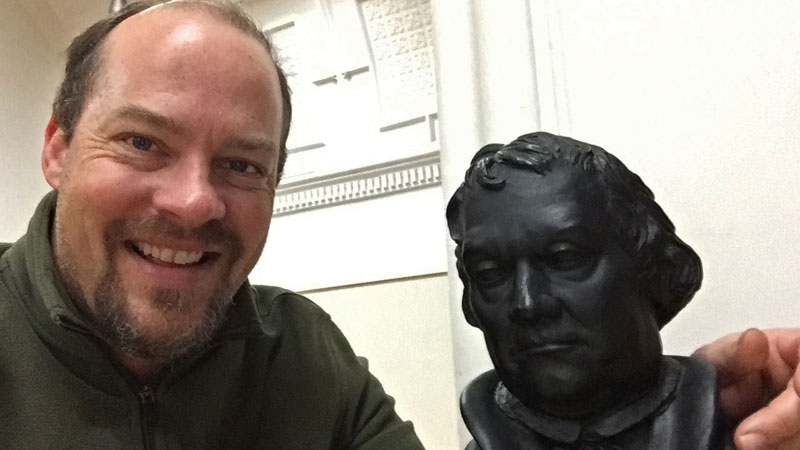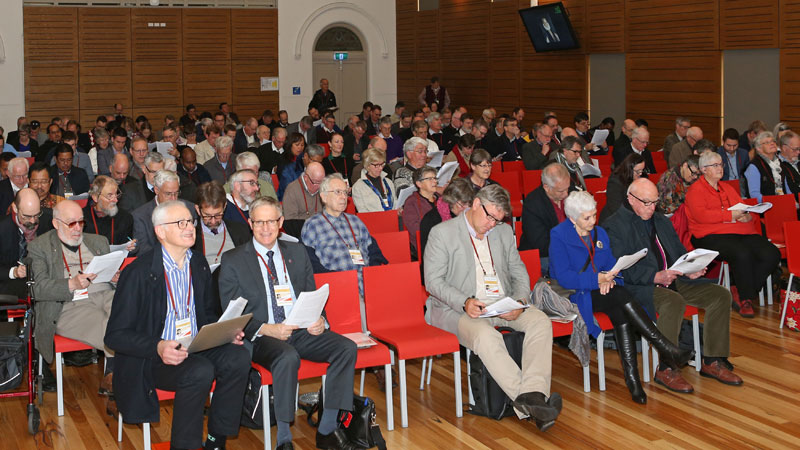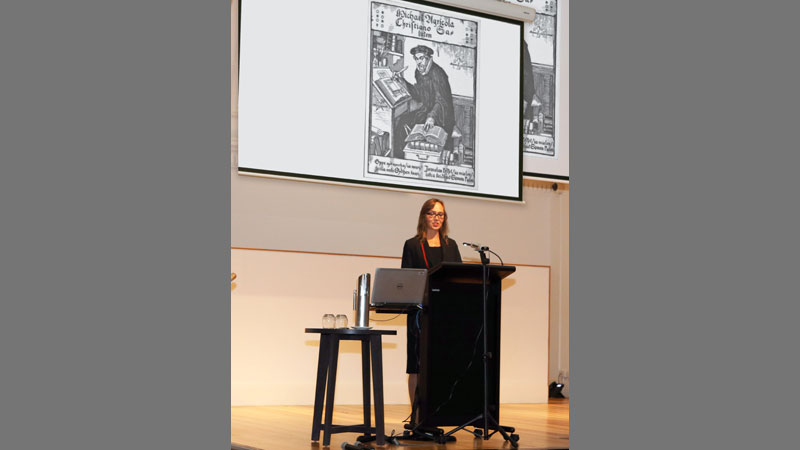500 years on, what would Luther say?
If the great reformer himself could have attended the Martin Luther@500 conference held in Melbourne recently, what would he think of everything being said and done in his name? We asked Pastor Reid Matthias, who attended the conference, to investigate.
He stands blockish and imposing, with his feet planted stolidly and his arms crossed in a posture of frustration. Unaware that I am watching, his brow is deeply furrowed and his concentration on the presenter is stark in the dimly lit hall.
Then he notices me. His frown deepens. Slowly, he beckons and I feel like Mowgli on his hypnotised walk towards the great snake, Kaa, in The Jungle Book.
We celebrate our HERITAGE, but it seems at times we are neglecting our INHERITANCE.
‘So’, he whispers, ‘what do you think?’ ‘It’s …,’ I wait to see if he’ll fill in the blank, but he does not, ‘… different’.
He nods, once again concentrating on the presenter’s words. ‘Ja, this is very interesting. I never knew it would last this long.’
Then it hits me – here is Martin Luther straight out of the 16th century. His once tonsured head is covered with hair; his strong, prominent jaw boasts a shadowy stubble. He looks exactly like the miniaturised statue brought in for this Martin Luther@500 conference from 28 June to 3 July 2016.
Almost 200 Lutherans have descended on Melbourne to hear lectures about the theology of the man standing beside me.
‘What do you think of the proceedings here at the Catholic Leadership Centre?’ He snorts, the irony is not lost on him. ‘I have some thoughts about everything, but I sometimes choose to keep quiet.’
It is my turn to snort. According to my Luther knowledge, holding his tongue was not his greatest strength. ‘But, how do you feel that we’ve all come together in your name 500 years after your challenge on the Wittenberg doors?’ ‘I wish they would have listened when I said “please don’t call yourself Lutheran, but Christian. What is Luther? The teaching is not mine! … How could it happen that I – poor stinking bag of worms that I am – end up having the children of Christ called by my miserable name? … Let us get rid of all party names and call ourselves Christians, after Christ, whose teaching we hold”.’ (as relayed by Dr Oswald Bayer)
‘Don’t be too hard on yourself’, I say, trying to comfort the reformer. ‘You’ve given such wisdom to the church.’ ‘Wisdom! Many of these people have much more wisdom than I. Did you hear Dr Franz Posset? “Today, then, let us look for what unites, and not what divides … Without one, strong, ecumenical voice there will be no meaningful Christian impact on the world”.’ I nod. ‘It would be a wonderful thing if the denominations of the world could band together under the common banner of what we share as Christians rather than what divides us.’
‘Think of the gift we could give to the world’, he says. ‘Dr Risto Saarinen – he hit the nail on the head. “Giving” is in many cultures and in the Bible connected with … the hands … God’s hands are considered as the vehicle, the instrument through which God gives good things.’
What gifts is God giving us in this new millennium? It seems that we have not lost faith, but faithfulness; we have not lost love, but hope. And grace, the gift which covers all disgrace, is largely left in the margins of our collective consciousness.
As Luther ponders the calluses on his hands and the scars of his Reformation experience, I consider words I have heard during the conference from Professor Theodor Dieter. A lack of love of God creates fear since a person is not totally ready to agree with what God wants her (or him) to do or what God wants to happen to her or him. In his Explanations Luther attributes fear both to a lack of love for God and an imperfect faith.
Luther searches my eyes. ‘What are you thinking?’ ‘To be a Christian seems almost impossible in our contemporary society, Herr Luther. We are continually bombarded by conflicting messages. We don’t live as if God is alive anymore. We don’t really live as if we, the body of Christ, are living.’ I bow my head and feel the reformer’s hand on my shoulder. ‘Look to the word’, he says. ‘Get back to the Scriptures as the centre of your existence.’ He punctuates his statement with a raised index finger, and his words are echoed by Professor Kirsi Stjerna. ‘Our faith is a deeply and proudly historical faith, but it is also a living and transforming faith, and increasingly global … This Lutheran tradition in its essence and from its founding principles is a reforming tradition embracing change.’
But what do we change? We celebrate our heritage, but it seems at times we are neglecting our inheritance. This change is not about determining what kind of music will be played during worship: this next reformative change must be a cosmic – not cosmetic – shift. ‘I can see it is hard’, he says. ‘All of you are faithful to Christ, but now it is time to return to trusting in God’s mercy and love. When it seems as though the night is about to overcome, it is then that the light will shine brightest.’ He smiles broadly as if capturing hope in a bottle and lighting his face with it. ‘You will see.’
‘Remember’, he says as he turns away, ‘the word is neither a lesson nor an appeal. People in the straits, who are under the power of temptation, losing themselves as they are confronted with the reality of death … may hold out for illusions of control until the very last. In the sacrament, Christ uses the word to go beyond words – to literally embody himself with the tempted, giving and shedding, joining the believer in a death like his to bestow a resurrection like his.’ (Professor James Nestingen)
We are bound to him because he has bound himself to us. In death and in life.
Luther proudly walks out of the Catholic Leadership Centre into the cold wind. He looks up at the clouds and smiles, then scratches his head and walks down the street. The odds are he is off to the pub to share life with the locals.
We need 500 more Luthers. We all need to make a stand.
This feature story comes from The Lutheran August 2016. Visit the website to find out more about The Lutheran or to subscribe.
READ MORE STORIES ABOUT 50.500, conferences, Reformation




